1-33 Rue de Maremne, 40390 Saint-Martin-de-Hinx, France #305
Open-air single walled fronton
› Location of the fronton
Address (approximate):
- 1-33 Rue de Maremne, 40390 Saint-Martin-de-Hinx, France
Coordinates GPS (latitude, longitude):
- decimal notation: 43.582327, -1.266871
- sexagesimal notation: 43° 34' 56.3772", -1° 16' 0.7356"
Nearby frontons (less than 5 kilometers)
- 40390 Saint-Martin-de-Hinx, France - #306 (Open-air single walled fronton • 91 meters)
- 40390 Saint-Martin-de-Hinx, France - #3113 (Trinquet • 191 meters)
- 40390 Sainte-Marie-de-Gosse, France - #313 (Open-air single walled fronton • 3.7 kilometers)
- 40390 Biaudos, France - #75 (Open-air single walled fronton • 4.7 kilometers)
- 40230 Saint-Jean-de-Marsacq, France - #312 (Open-air single walled fronton • 4.8 kilometers)
- 40230 Saubrigues, France - #3211 (Left walled fronton • 4.9 kilometers)
📚 The Basque pelota (Euskal pilota) includes several ball games derivated from the Jeu de Paume. In most specialties, the game consists of sending, volley or after a rebound, the ball against a main wall, named fronton, so that it falls on the playground named cancha. The point continues until a team commits a foul (falta) or fails to raise the ball before the second rebound.
🤓 A fronton is a wall against which one plays Basque pelota. It is an architectural element present in almost all the towns and villages of the French Basque Country and, to a lesser extent, in the neighboring regions.
The open-air single walled fronton is a generally uncovered ground composed of a wall, or two (one at each end). There are frontons of all sizes (10 to 16 meters wide and 6 to 10 meters high), some are even covered.
In Basque, this place is called "plaza".
🌎 A large number of Basques (commonly referred to as "Basque diaspora") have left the Basque Country to emigrate mainly to South America and the United States.
It is sometimes called the "eighth province" of the Basque Country, which counts seven (Labourd, Soule, Lower Navarre, Navarre, Biscay, Álava and Gipuzkoa).
The diaspora actively promotes its identity through its traditional activities, such as dance, gastronomy, Basque games and, of course, Basque pelota.
👉 See all open-air single walled frontons
Added on December 28 2011
Last modified on April 21 2018
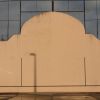
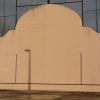
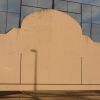
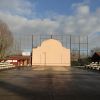
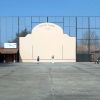
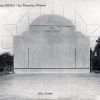
 @FRONTONS_NET
@FRONTONS_NET  Run Square
Run Square 
